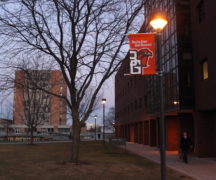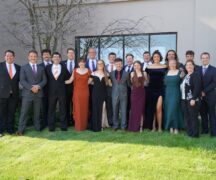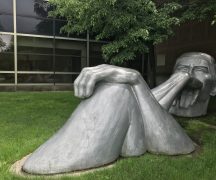By DAVID DUPONT
BG Independent News
While Bowling Green State University has been pushing students to get off campus for internships and co-operative learning, for one program that’s not working.
The Flight Technology Operations program asked Faculty Senate Tuesday to approve removing the requirement for a co-op for flight students.
That was part of a number of changes for the rapidly growing major.
Carl Braun, an instructor in the program and the liaison with the Falcon Flight Center operated by North Star Aviation, said when he arrived in 2016, the program had 63 students, now it has almost 400.
That growth has meant the need for changes, so it could run more efficiently and get students out the door and into the air.
Braun said the program has a 90-percent placement rate for graduates, and that’s improving. Even before students have clocked the required 1,000 hours of flight needed to be licensed, regional airlines are hiring them.
The need to get those flight hours is the reason the co-op requirement needed to go. Before students have those 1,000 hours they cannot do any flight related activities. So they may take the summer to do a co-op program in Alaska, or California, or Florida, and end up handling baggage or mowing lawns. “That’s counterproductive,” Braun said.
It also robs the students the chance to get quality flying time back in Bowling Green during the summer.
Students often have to take incomplete in flight training because of the weather.
The training requires good weather “which can be lacking in the closing weeks of fall semester and most of spring semester. … We do have fierce winters in Northwest Ohio.”
He added: “We’re in the process of converting our program into a 12-month program to have more students flying in the summer time.”
Continuity in flight training is crucial, he said.
And it is important for students financially. Flight students pay an additional $8,000 for training on top of their tuition.
Other course and requirement changes are being made, such as broadening the choice of communication courses a student can take to fulfill that requirement.
Braun noted that the program has to comply with Federal Aviation Administration requirements as well as those of the university.
The changes were approved by the senate.
Also, approved were changes in the curriculum for the history major. The changes have been in the works for three years, said Professor Rebecca Mancuso, who presented the resolution to the senate. “About four years ago the faculty in history collectively expressed dissatisfaction with our outdated curriculum.”
That curriculum, she said, had been in place since 1950s.
One requirement epitomized how behind the times history was. Students were required to take a course in United States History, European History, and in “other,” a catchall that included Latin America, Asia, and Africa.
“This was more than a tweak,” Mancuso said. “We wanted to do a whole revamp. Out with the old in with the new. Sounds strange for a historian to say that but that’s what we wanted to do.”
The curriculum includes more diverse offerings, covering in more depth all those lumped under “other.”
At the upper levels students will have to focus on a particular theme by taking six courses.
By broadening the curriculum to study more underrepresented people, she said, the department hopes to attract more students from underrepresented groups.
The new curriculum is supported by a “scaffold” of methods courses. In the first year students will take a course in the craft of being a historian. The second year will be a course in how to write as a historian.
The third year will cover the historian’s relationship to the public, including demonstrating how those skills learned in the discipline are applicable to the outside world.
The fourth year will be a course to provide support as they write their capstone research paper.
The senate also approved changes in the World Music major, which involved having a single course number for ensembles, offering seminars with variable topics, and removing jazz history as a requirement.





